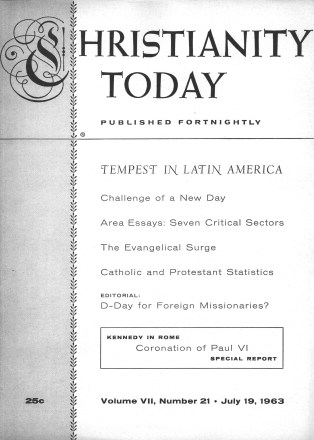At the center of the current debate over the matter of communicating the message of the Christian Evangel to our generation stands the figure of Rudolf Bultmann, formerly a professor at the University of Marburg.
Basic to Bultmann’s message is, of course, his thesis that the message of the New Testament is couched in mythological language. That is to say, he holds that the New Testament writers thought in terms of a world-view which is no longer intelligible to the minds of men. He takes exception, in behalf of Modern Man, to what he regards as an outdated cosmology which he holds to underlie the entire structure of the Gospels, the Epistles, and the Book of Revelation. He contends that these records are bound inextricably to a view of a three-layered universe, of a geocentric astronomy, and of a philosophy of history which is no longer meaningful to the man of today.
He proposes, in the light of this, that the New Testament is to be taken in its entirety. In actual practice he resorts to eliminating certain passages by the expedient of regarding them as interpolations. But his explicit intention is to leave the New Testament whole, and then to “interpret” it in its entire form in such a manner as to expose the basic truth which he feels to underlie its “mythological” elements. He has made a name for himself through his elaboration of the process of “demythologizing,” by which he proposes to peel away the layers of “myth” which overlay the “real” message of the New Testament writers.
The objectives of his method are as follows: first, to reinterpret the message of the Gospel in a manner which will eliminate thought-elements which are either unintelligible or objectionable to the modern mind; second, to restate the message of the New Testament in “existential” terms; and finally, to discover the manner in which the “Gospel” as he understands it may lead men into “authentic” existence.
The first of these objectives is to be achieved by means of the application of the canons of form-criticism. This is a sophisticated method, utilizing what Bultmann insists are reconstructive techniques. That is to say, he has professed to discover the steps by which “myths” are made, and then has applied them in reverse so as to discover what he believes the “facts” behind the narratives might have been. Now, those who have studied the process of “demythologization” with some measure of objectivity have come to the conclusion that the entire method rests upon an a priori assumption concerning the nature of the end product toward which the process moves.
The second of these objectives, the restatement of the Christian Evangel in “existential” terms, rests upon a mode of interpretation which makes use of a multiple understanding of truth and of history. That is to say, it assumes that empirical truth is one thing, while “truth” for the individual in encounter with God in “crisis” is another. The field of myth enters into this second phase; it does not attempt to state what man’s actual relation to his world is, but only what that relation is understood existentially to be.
Bultmann’s third objective, the exposition of the Gospel as a way to “authentic” existence, centers in the existentialist distinction between mere being-in-the-world on the one hand, and one’s existence as an accountable and responsible individual on the other. This sounds plausible enough on the surface. When we look a bit deeper, however, we note that Bultmann suggests that authentic existence is an ambiguous term, and that he is highly ambiguous about the possibility of achieving it.
Having noted what Bultmann evidently intends to say to our day, we turn to note some of the things which he may be saying to evangelicals by indirection. First and foremost, he does attempt to render the Christian “message” intelligible to the men and women of our day. It seems to many of us as if he were so preoccupied with the “modern mind” that it drives more important issues into secondary place. However, he provides perennial reminder that unless our message has relevance to the hearer, its proclamation will remain ineffective. The minister of God’s grace who will speak to his generation will do well to hear at least this from the message of Bultmann, however little of Bultmann’s actual techniques he may use.
Second, Bultmann would challenge us to be sensitive to the meaning of words. Certainly his lesson is taught in terms of inacceptable hyperboles and absurd exaggerations. Certainly his “existentialist” interpretations carry the analysis of language too far. At the same time, evangelicals will do well to cultivate a sensitivity of their own to verbalizations. They will likewise be well advised to recall that there are few “bare facts”—that is, that all fact-situations involve interpretation.
In addition to a sensitivity to relevance and to the meaning of words, evangelicals may learn from Bultmann regarding some of the aspects of what he calls authentic existence. Without assenting to the radically individualistic and idiosyncratic overtones of this term, one must recognize that Christians are not exempt from the danger of living upon mere tradition, upon mere “received” norms, upon the basis of a mere protective coloration of the social or religious group. There is a perennial need for emphasis upon personal existence, in terms of the overt acceptance of personal initiative and the frank assumption of personal responsibility.
Finally, Bultmann’s system shows once again that there is a genuine “either/or” attached to the Christian Gospel. It may assume a form quite different from what Bultmann would expect. For the evangelical, the question is: either a frank supernaturalism, grounded in revelation and centering in the Incarnation and the Atonement in Jesus Christ, or a humanism which ultimately denies the supernatural and throws man back upon the purely natural. The exposition of Bultmann’s thought by his disciples must make this alternative painfully clear to their teacher himself.










